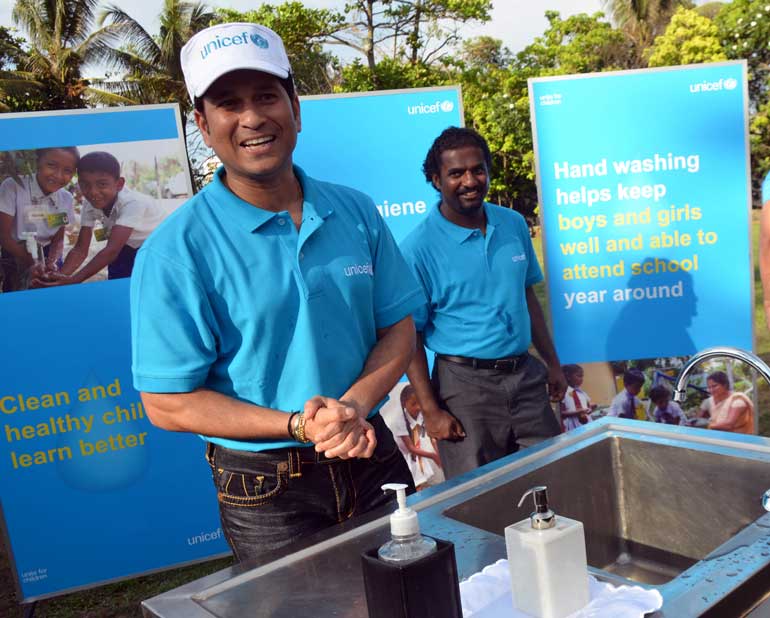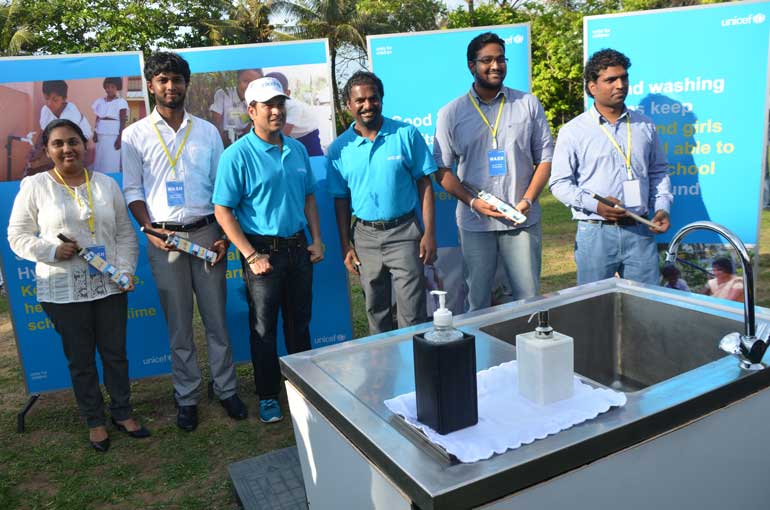Thursday Feb 26, 2026
Thursday Feb 26, 2026
Thursday, 15 October 2015 00:00 - - {{hitsCtrl.values.hits}}

From left: UNICEF South Asia Regional Chief of Communications Jean-Jaques Simon, UNICEF Sri Lanka Representative Una McCauley, UNICEF South Asia Goodwill Ambassador Sachin Tendulkar, Cricketer Muttiah Muralitharan, UNICEF Sri lanka WASH Specialist Suranga De Silva and UNICEF
Sri Lanka Communication Specialist Suzanne Wooster Prematilaka

Sachin & Murali together to prmote Hygiene and Sanitation 
Sachin & Murali with winners of Sachin & Murali fb Competition
By Shannine Daniel
International cricket legend and UNICEF Regional Goodwill Ambassador Sachin Tendulkar together with Sri Lanka’s own cricketing hero Muttiah Muralitharan have partnered to promote sanitation and hygiene in Sri Lanka.
Since 2008, Tendulkar has been promoting hygiene and sanitation in India and after being appointed as the UNICEF Regional Goodwill Ambassador for South Asia in 2013, he has supported the organisation by giving key messages related to hygiene and sanitation especially to children and adolescents.
“We as a team have to beat all the diarrhoeal diseases,” he said. “When I was told that 1,600 children die every day of diarrhoeal diseases, it was really disheartening,” he added. He further stressed on the importance of good hygiene, such as the simple act of washing hands with soap in order to prevent spreading of said diseases. “We have to make an effort to get together and put this to an end,” he added.
Muralitharan has teamed up with Tendulkar in order to lend his support to promote the initiative on hygiene and sanitation in the country. “It is our duty to raise awareness among the public and support them, however it is up to the public to take these measures to heart and act on it,” says Muralitharan.
Using world class sports people as ambassadors is a key way of raising awareness among the population said UNICEF Sri Lanka Representative Una McCauley. The UNICEF, along with Tendulkar and Muralitharan hopes to improve the situation in deprived areas which do not have access to clean sanitation, thus ensuring that all children and families in Sri Lanka can live a healthy and dignified life.
Though Sri Lanka does stand better than other countries in the region with its high national coverage for access to clean sanitation in households and schools at 86% and 83% respectively, these figures hide sizeable disparities and a need for specially adapted solutions in certain areas such as the remote rural areas, especially in the North and East.
“We need to be aware that providing access to the remaining households is indeed more challenging,” UNICEF WASH Sector Specialist Suranga De Silva said.
“When we analyse the 2012 national statistics data, we see that 12 out of the total 25 districts of our country, have yet to reach this national average of 86% of sanitation in households. In fact some of these districts are very close to achieving the national coverage, while the rest still have a long way to go,” he added.
Sri Lanka does have commendable norms regarding sanitation and hygiene in schools however there are equity gaps; 17% of schools are yet to reach the national coverage of sanitation. Reasons for this may include regional disparities and inaccessibility to improved sanitation. McCauley stated that, “Poor maintenance and lack of knowledge and practices are some of the reasons for these disparities.” Due to this reason children from these schools are more likely to get sick and more likely to miss school because they don’t have adequate sanitary facilities, she added. Also commenting on the matter UNICEF Regional Director for South Asia Karin Hulshof mentioned that, “A healthy, clean school environment keeps children, especially girls, in school.”
“Collective work is indeed needed to empower the public not just with facilities, but also with essential skills, attitudes and practices. In fact we need to look beyond infrastructure and invest more on improving practices related to hygiene,” added De Silva.
Sanitation has been identified as a national priority by the Sri Lankan Government and it is currently developing national sanitation policies, especially in the area of human excreta disposal which is a key priority in the near future.
Under its current program of cooperation with the Government of Sri Lanka, UNICEF works with the Ministry of City Planning and Water Supply, the National Water Supply and Drainage Board, the Ministry of Education, schools and NGOs to support national capacity development to make sure that at least 80% of communities in low-coverage areas have equitable access to and use safe water and improved sanitation facilities.
Specifically, in terms of water safety UNICEF supports activities that strengthen the assessment and monitoring of water and sanitation provision in rural communities, the promotion of water quality surveillance, and the introduction of Disaster Risk Reduction (DRR) training and capacity building for the sector to mitigate the effects of climate change. In schools the UNICEF focuses on improving water quality surveillance and water, sanitation and hygiene in schools.
Over the next year Tendulkar plans to visit two more countries in the South Asian region and communicate with audiences especially children and youth on the importance of sanitation and hygiene.
Pix by Shehan Gunasekera